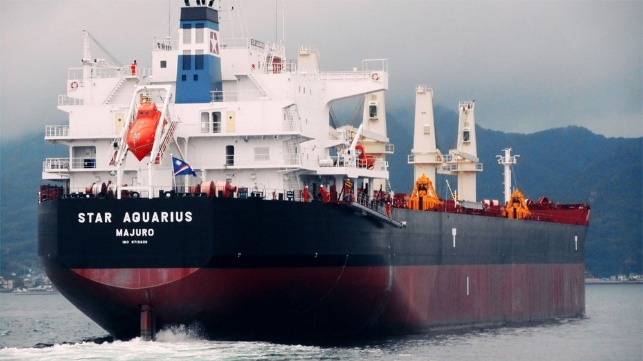Star Bulk Cites Charters, but Says it Will Now Avoid Red Sea Transits

Greece’s Star Bulk Carriers is joining the long list of carriers that have said they will be diverting all ships from the Suez Canal and Red Sea transits after two of the company’s vessels in recent days had been attacked by the Houthi. The company cited the intricacies of charter party agreements in its delay in diverting ships but said it was now taking the action even as the European Union on Tuesday officially launched its protection mission.
“Going forward, we will not be passing the Suez Canal anymore because we are obviously a target of the Houthis being a public company registered in the U.S.,” Petros Pappas, Chief Executive of Star Bulk Carriers, told investors on the year-end results conference call.
The company announced its decision to divert future sailing on Tuesday, February 13, a day after two missiles were fired at its vessel Star Iris, registered in the Marshall Islands, while transiting the Red Sea carrying corn from Brazil. The vessel was bound for Iran displaying the destination on its AIS. The U.S. Central Command said after the incident that the vessel remained seaworthy but reported minor damage. The prior week, the Houthis also attacked another Star Bulk vessel, Star Nasia, while transiting the Gulf of Aden. CENTCOM reported that three anti-ship ballistic missiles were used with one causing minor damage, a second impacting the water near the ship with no effect, and the third intercepted and shot down by USS Laboon.
“We had two cases of various charters where we asked our charters not to go through the Suez Canal but legally, we could not do that,” said Pappas explaining that they were advised they had to follow the charter party agreements. In addition, he said the company was not at the time aware of the attack on the Eagle Bulk vessel and other bulkers.
When the Star Nasia was targeted, Pappas said the Star Iris was already making the Suez Canal transit. “So, we could not divert,” he told investors.
He cited the disruptions from the diversions from the Red Sea as well as the problems at the Panama Canal and port congestions as causing inefficiencies that would limit fleet growth. However, he said skipping the Red Sea will also mean that the company is not exposed to insurance rates which Pappas said right now “have gone up a little bit.”
The same day that the second Star vessel was targeted, the Council of the European Union officially commissioned EUNAVFOR Aspides, its maritime security effort for the Bab-el-Mandeb, Red Sea, Arabian Sea, Gulf of Oman, and extended its scope to also include the Strait of Hormuz and the Persian Gulf. They noted that conclusions had been first reached on October 24, with the Council approving the mission concept on January 29.
Commodore Vasileios Gryparis of Greece was named commander on Tuesday with the operational headquarters to be set up in Larissa, Greece. The mission will accompany and protect vessels and ensure maritime situational awareness in the region. They noted it is for the freedom of navigation and highlighted that it should remain defensive in nature. The mandate is for one year.

that matters most
Get the latest maritime news delivered to your inbox daily.
The new mission will coordinate with Atalanta which is responsible for Somalia, the western Indian Ocean, and portions of the Red Sea, as well as the U.S.-led Operation Prosperity Guardian. The EU, however, in the mandate also calls for “targeted diplomatic outreach,” both to Gulf Cooperation Council partners, regional actors, and coastal states.
No details have been announced when the EU mission would become operational. Denmark however deployed a frigate at the end of last week in the Red Sea joining France which has been operating independently. Italy already has vessels in the region for Atalanta and Germany at the end of last week reported it had dispatched a frigate to the Mediterranean in anticipation of the start of the mission.
